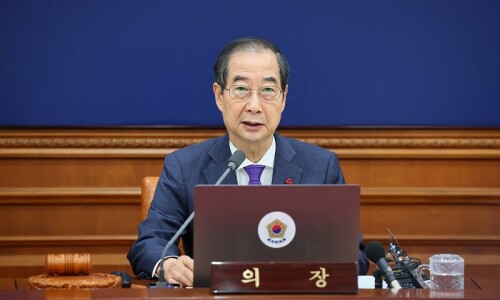It has serious reservations over the GDS formula for revenue distribution and deems it unjust and unfair. The federal government deducts two per cent as collection charges and distributes GDS amount in the ratio of gas produced in the provinces.
The NFC has constituted a committee to review and devise a new GDS formula to resolve the dispute between Sindh and Balochistan. The committee would submit its recommendations in the next NFC meeting on October 12 and 13 in Quetta.
GDS is the net difference between the total cost of gas (wellhead price, costs of utilities including operating charges, gas losses and return on assets) and end sale price of gas excluding GST.
Balochistan's viewpoint is that investment at Sui in the Bugti tribal area was made in 1952 when the investment was not as costly as it is in Sindh and Punjab. The differences between the average wellhead cost and average sale price of Sui gas should be the highest. Similarly, the province's share in the gas revenue should be highest.
When this formula was introduced in the 1990 NFC award, Balochistan was producing about 70 per cent gas and it was getting most of the GDS revenues. Presently, the province is producing less than 25 per cent gas. It is not satisfied with the formula and demands, taking into account the actual contribution to the GDS by provinces in the distribution formula.
The GDS amount may vary slightly from year to year, but is targeted at around Rs15 billion. After two per cent cut as collection charges, the federal government distributes Rs14.7 billion in the ratio of gas produced in the provinces. Balochistan makes the largest contribution to the generation of total GDS revenues, as the weighted average wellhead price of gas in the province is lowest among the four provinces. The province therefore deserves the biggest slice of the GDS instead of the present around 23 per cent.
Similarly, the Sui gas field wellhead price is notified by the federal government under the Gas Pricing Agreement signed in 1985. Under the accord, all the investments for development of the field after 1985 were to be made by the federal government. A major issue with Balochistan has been that the wellhead price notified by the federal government has been lower in comparison with the policy price of the gas fields which came later into production; this has resulted in a low royalty amount.
The reduction in the province's gas revenue has adversely affected its annual development plan (ADP). It received Rs17 billion during FY 2003-04, while there was an increase of 11 per cent revenue of federal and three provincial governments under this head. For the FY 2005-06, it got Rs5.3 billion from the GDS but in the revised estimates, the figure came down to Rs4.8 billion. This reduction of Rs1.3 billion was a serious blow to the financial health of the province. Its share in transmission of natural gas is shrinking as more wells are found in other provinces.
The province has been demanding an increase in the well head price of its gas to bring it at par with the rates in Sindh and the Punjab. Some five years ago, Balochistan was getting merely Rs22 per MMBTU while Sindh was getting Rs126 per MMBTU and Punjab Rs180 per MMBTU for some of its wells.
If the prices were made uniform with that of Sindh gas, Balochistan would get additional revenue for meeting its development needs. There has been however a systematic increase of wellhead price of the Sui gas field every six months for the past few years. The royalty for Sui gas field in the fiscal year 2007-08 was deemed Rs2538 million with average wellhead gas price of Rs100.69 per MMBTU. In the last fiscal year, the royalty for Sui gas field was estimated at Rs3333 million with average wellhead gas price of Rs139.84 per MMBTU.
While the federal government is arbitrarily subsidising the sale of natural gas from Balochistan to consumers in other provinces without its consent, the province is left with no funds to finance its annual development programme. According to one estimate, the subsidy for Sindh is around Rs1.72 billion and for Punjab and the NWFP Rs12.92 billion. The subsidy being given to the fertiliser sector in terms of fuel, amounts to Rs1.054 billion, cement sector Rs34.64 million, fertiliser (feedstock) Rs31.03 million, CNG Rs24.12 million, general industrial sector Rs424.15 million and commercial sector Rs54.67 million. All the subsidies are being provided at Balochistan's expense.
Sui gas field is still the country's single largest gas field, which produces around 800 MMscf of natural gas daily from 87 wells. If it continues with the same speed, these reserves could hardly last for eight to 10 years. The gas reserves discovered in Sui were to the tune of 9.625 trillion cubic feet in 1952. Commercial exploitation of the field began in 1955. Since then, the Sui field has been meeting a significant amount of the country's energy requirements.
The production from Sui gas field is a vital source of huge foreign exchange savings as the same would have been spent on the import of energy had the gas reserves not been discovered in abundance. Unfortunately, the province has been deprived of its due share in royalty and economic benefits.
The Pakistan Petroleum Ltd. (PPL) is the operator of Sui gas field. The federal government obtained more than 63 per cent shares of the PPL from Barmah Oil Company in 1997 to raise its stakes to about 94 per cent. Later, it decided to privatise the company but the Balochistan Assembly adopted a resolution asking the federal government to give its ownership to the province. The PPL ownership could become a source of revenue to the least developed and cash-starved province.












































